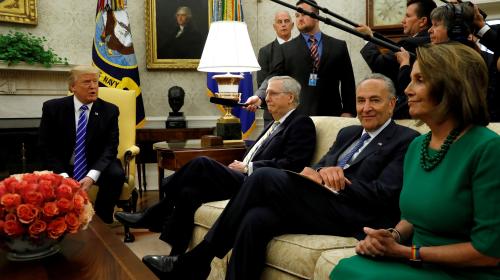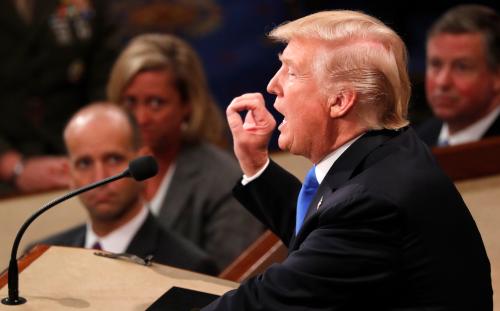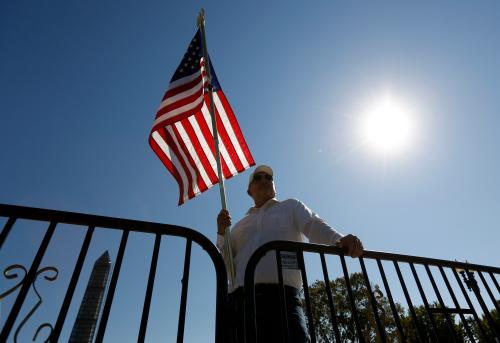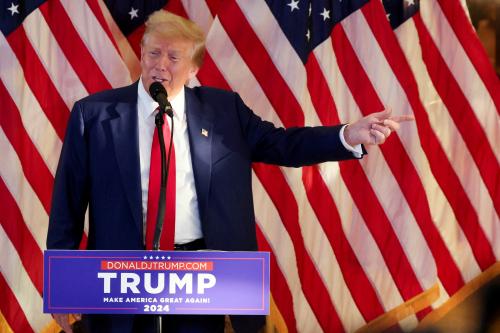Last week, President-elect Donald Trump and Vice President-elect Mike Pence cut a deal with Carrier Corporation to keep 800 jobs in Indiana and offered the company a $7 million tax break in return.[1] The move perturbed GOP congressional leadership who struggled throughout the campaign to reconcile the president-elect’s populist message on trade and globalization with traditional conservative principles staunchly opposed to protectionism. The Wall Street Journal’s editorial board condemned the Carrier deal, and Sarah Palin denounced the move as “crony capitalism.” However, recent polling shows Trump’s first major action on his campaign promises fares well with a majority of voters.
Sixty percent of voters say that the Carrier deal gave them a more favorable view of Trump, a POLITICO/Morning Consult poll finds. This includes 87 percent of Republicans, 54 percent of independents, and 40 percent of Democrats. Only nine percent say the deal made them view Trump less favorably. Highlighting the findings of the poll, Morning Consult co-founder and chief research officer explained, “Rarely do we see numbers that high when looking at how specific messages and events shape public opinion.”
Over the weekend, Trump doubled down on his campaign promise to keep jobs at home and punish companies who move jobs overseas. In a recent Tweet, he wrote “There will be a tax on our soon to be strong border of 35 percent for these companies wanting to sell their product, cars, A.C. units etc., back across the border.”
House Majority Leader Kevin McCarthy registered his skepticism concerning Trump’s push to impose tariffs on American companies that ship jobs overseas. “I believe in the free market. I don’t think the government should be picking winners or losers,” McCarthy told reporters on Monday. Contrast McCarthy’s statement with Pence’s remarks promoting the Carrier deal—“the free market has been sorting it out, and America’s been losing.”
Striking a similar note as McCarthy, House Speaker Paul Ryan offered an alternative to import tariffs, stating, “We believe comprehensive tax reform is the best way to get at the issue of whether or not a company chooses to stay in America or produce their products in America.”
While most congressional Republicans support tax reform and oppose legislation that would introduce the kinds of tariffs Trump favors, there exists a growing divide between GOP leadership and their Republican voters.
Seventy-four percent of voters support increasing taxes on companies that move their jobs overseas, including 80 percent of Republicans and 72 percent of Democrats.
While Republicans on the Hill have historically attacked individual deal-making with private companies, over 50 percent of voters say it is acceptable for the president to negotiate directly with businesses. A majority of voters also support presidential actions such as offering tax breaks, incentives, and contracts to individual companies in order to keep jobs in the U.S.

The response to Trump’s Carrier deal signals more trouble ahead for the dilemma facing the GOP and an exacerbation of its structural tensions. In a Wall Street Journal column written earlier this fall William Galston, one of the co-authors of this post, argued that the GOP is now divided into three strands of conservatism—establishment conservatism; small-town, small-government conservatism; and populist conservatism. The establishment conservatives “reflect the interests of corporate America” and take an internationalist approach. The more nationalist small-town, small-government conservatism of the Paul Ryan variety posits that “government is the principle obstacle to growth” while Trump’s populist conservatives “do not have an ideological preference for smaller government” and instead “see large corporations as indifferent, even hostile, to their interests and concerns.” Establishment conservatives will increasingly struggle to find a home in the new GOP coalition while the potential cooperation between small-government conservatives and populist conservatives would become the governing imperative for the GOP. How the party manages Trump’s push to reward and punish individual companies, and the support such action enjoys among voters, will test how stable the common ground shared small-government and populist conservatives really is.
1 While Trump declared the deal saved more than 1,000 jobs from offshoring, Chuck Jones, president of the United Steelworkers 1999 union that represents Carrier workers says only 800 jobs will remain in Indiana, a number Carrier has confirmed confirmed. 550 union members will still lose their jobs and United Technologies, Carrier’s parent company, will moving 700 factory jobs from Huntingdon, Indiana to Monterrey, Mexico.






Commentary
The positive response to Trump’s Carrier deal poses a challenge to GOP leadership
December 12, 2016